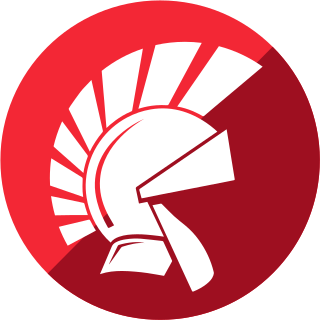
An integrated development environment (IDE) is a software application that provides comprehensive facilities to computer programmers for software development. An IDE normally consists of at least a source code editor, build automation tools and a debugger. Some IDEs, such as NetBeans and Eclipse, contain the necessary compiler, interpreter, or both; others, such as SharpDevelop and Lazarus, do not.
Visual Basic for Applications (VBA) is an implementation of Microsoft's event-driven programming language Visual Basic 6, which was declared legacy in 2008, and is an associated integrated development environment (IDE). Although pre-.NET Visual Basic is no longer supported or updated by Microsoft, the VBA programming language was upgraded in 2010 with the introduction of Visual Basic for Applications 7 in Microsoft Office applications. As of 2020, VBA has held its position as "most dreaded" language for developers for 2 years, according to some who participated in surveys undertaken by Stack Overflow..

Delphi is a software product that uses the Delphi dialect of the Object Pascal programming language and provides an integrated development environment (IDE) for rapid application development of desktop, mobile, web, and console software, currently developed and maintained by Embarcadero Technologies.

In computing, a visual programming language (VPL) is any programming language that lets users create programs by manipulating program elements graphically rather than by specifying them textually. A VPL allows programming with visual expressions, spatial arrangements of text and graphic symbols, used either as elements of syntax or secondary notation. For example, many VPLs are based on the idea of "boxes and arrows", where boxes or other screen objects are treated as entities, connected by arrows, lines or arcs which represent relations.

Microsoft XNA is a freeware set of tools with a managed runtime environment that Microsoft developed to facilitate video game development. XNA is based on .NET Framework, with versions that run on Windows and Xbox 360. XNA Game Studio can help develop XNA games. The XNA toolset was announced on March 24, 2004, at the Game Developers Conference in San Jose, California. A first Community Technology Preview of XNA Build was released on March 14, 2006.

Microsoft Visual Studio Express is a set of integrated development environments (IDEs) developed by Microsoft as a freeware and registerware function-limited version of the non-free Microsoft Visual Studio. Express editions started with Visual Studio 2005.
Active Scripting is the technology used in Windows to implement component-based scripting support. It is based on OLE Automation and allows installation of additional scripting engines in the form of COM modules.

The original Visual Basic is a third-generation event-driven programming language from Microsoft known for its Component Object Model (COM) programming model first released in 1991 and declared legacy during 2008. Microsoft intended Visual Basic to be relatively easy to learn and use. Visual Basic was derived from BASIC and enables the rapid application development (RAD) of graphical user interface (GUI) applications, access to databases using Data Access Objects, Remote Data Objects, or ActiveX Data Objects, and creation of ActiveX controls and objects.
TypeScript is a programming language developed and maintained by Microsoft. It is a strict syntactical superset of JavaScript and adds optional static typing to the language. TypeScript is designed for the development of large applications and transcompiles to JavaScript. As TypeScript is a superset of JavaScript, existing JavaScript programs are also valid TypeScript programs.

Rational Software Modeler (RSM), made by IBM's Rational Software division, is a Unified Modeling Language (UML) 2.0-based visual modeling and design tool. Rational Software Modeler is based on the Eclipse open-source software framework and is used for visual modeling and model-driven development (MDD) with UML for creating applications and web services. IBM ceased marketing Rational Software Modeler in 2010 and ended support for it in 2015. Much of the same functionality is now available through Rational Software Architect.
Visual Studio Tools for Office (VSTO) is a set of development tools available in the form of a Visual Studio add-in and a runtime that allows Microsoft Office 2003 and later versions of Office applications to host the .NET Framework Common Language Runtime (CLR) to expose their functionality via .NET.

Microsoft Visual Studio is an integrated development environment (IDE) from Microsoft. It is used to develop computer programs, as well as websites, web apps, web services and mobile apps. Visual Studio uses Microsoft software development platforms such as Windows API, Windows Forms, Windows Presentation Foundation, Windows Store and Microsoft Silverlight. It can produce both native code and managed code.
Visual Studio Tools for Applications (VSTA) is a set of tools that independent software vendors (ISVs) can use to build customization abilities into their applications for both automation and extensibility. Those customization abilities can be used by end-users to tailor the ISV's application within a managed extensibility environment just like Visual Basic for Applications.
Visual Studio eXtensibility (VSX) is a feature of software supplier Microsoft's Integrated Development Environment, Visual Studio. Visual Studio is a tool that can be used to develop applications for the .NET Framework and for the Win32 platform, also Microsoft products. The Visual Studio software development kit, first released by Microsoft together with the 2005 version of Visual Studio, included documentation, samples, and code to help develop products integrate with the Visual Studio product family.
Text Template Transformation Toolkit is a free and open-source template-based text generation framework. T4 source files are usually denoted by the file extension ".tt".
Liquid XML Studio IDE is a Windows based XML editor and XML data binding toolkit. It includes graphical editors for authoring XML documents, XML Schema, WSDL documents, XSLT documents and HTML documents. It also includes user interface extension to Microsoft Visual Studio through the Visual Studio Industry Partner (VSIP) program.

Xamarin is a Microsoft-owned San Francisco-based software company founded in May 2011 by the engineers that created Mono, Xamarin.Android and Xamarin.iOS, which are cross-platform implementations of the Common Language Infrastructure (CLI) and Common Language Specifications.

Visual Studio Code is a source-code editor made by Microsoft for Windows, Linux and macOS. Features include support for debugging, syntax highlighting, intelligent code completion, snippets, code refactoring, and embedded Git. Users can change the theme, keyboard shortcuts, preferences, and install extensions that add additional functionality.
The Language Server Protocol (LSP) is an open, JSON-RPC-based protocol for use between source code editors or integrated development environments (IDEs) and servers that provide programming language-specific features. The goal of the protocol is to allow programming language support to be implemented and distributed independently of any given editor or IDE.








